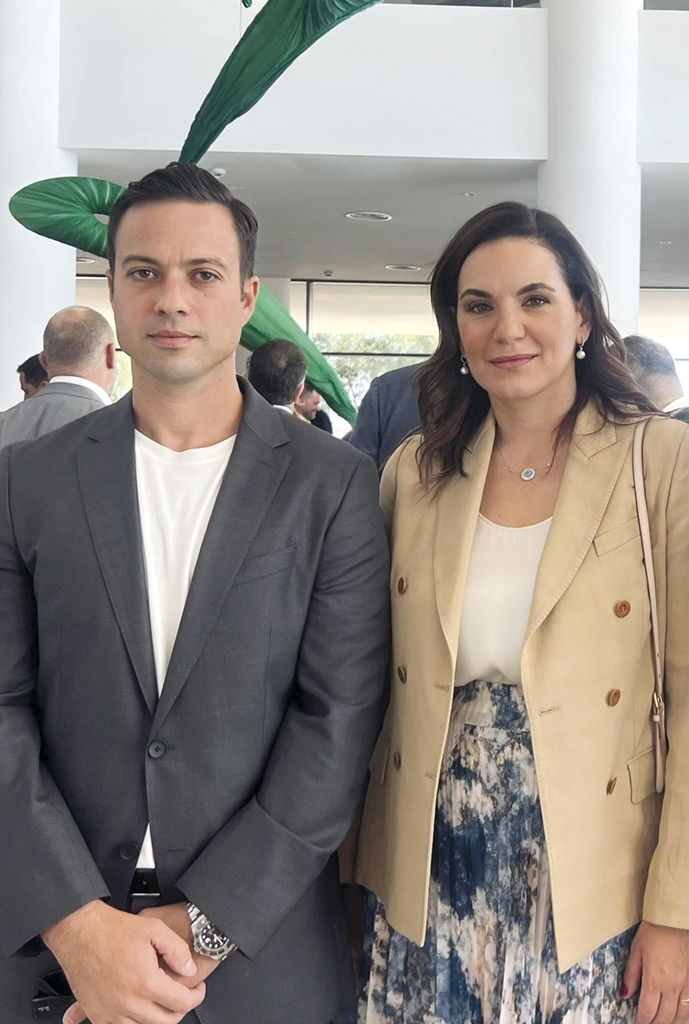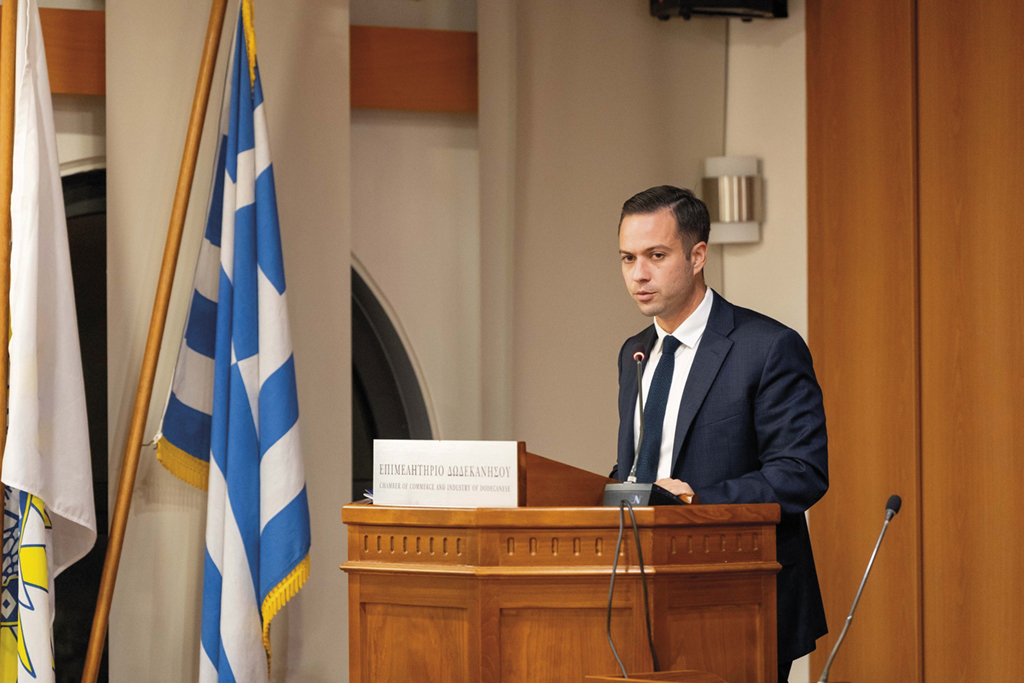- VAT, resilience fee and short-term rentals “require” solutions
- Highlighting best hotel employer practices
- Strategic planning more necessary than ever
Chess player of high level, with teachers some of the top chess players of our time, Yannis Hatzis, the new president of the Panhellenic Federation, takes over at a time when the Greek hotel, looks like a queen, which with a correct movement can checkmate, but with a mistake can be found with its back against the wall.
Dynamic, with a long track record, despite his young age, the new president of POX has to balance between the excellent performance of a number of hotels that “drag the supercargo of Greek tourism”, but also -most of the hotels that form its backbone and are facing major problems. And balance exercises are required, perhaps greater than the sale of small loans he made in his youth in Zaire, in parallel with the family businesses in this distant African country, from which leading hotel families of Rhodes started their business activity. He is lucky, however, because he can “walk” in POX on the road paved by the -president of the presidents- Vasos Minaidis, and more recently Antonis Kambourakis.
Yannis Hatzis spoke to MONEY & TOURISM, in his first major interview since assuming his responsibilities and through this he unfolds his planning, the challenges that the industry must face, the plan of assertions and the measures he would take immediately. He does not even hesitate to talk about the “smartass” that distinguishes the Greek economy and society, to express his estimates for 2024, but also to set out his claims to the political leadership.
The President of POX makes special reference to the chaos and problems faced by hotel businesses with the development law and urgently calls for immediate measures for:
-the reduction of VAT in the sector
-short-term renting
-long-term strategic planning for the sector
And of course, he could not but explain expound on the importance of highlighting good employer practices in the sector, which should not be underestimated but promoted.
And as he says, “The image of 10,000 hotels cannot be tarnished by isolated cases of bad employers that exist in all sectors. The hotel sector is one of the few sectors of the Greek economy, if not the only one, that has maintained its collective bargaining agreement in force during the memoranda”.
Likewise for sustainability practices, whose importance is crucial for the future of Greek tourism!
And last but not least, addressing his fellow hoteliers, he emphatically notes: Regardless of the actions taken by the state, we must first collectively decide where we want to go and then chart our course.
The interview
The interview of the president of POX Mr. Ioannis Hatzis to Konstantinos St. Deriziotis is as follows:
The industry faces a series of successive challenges. How do you perceive them?
The Covid-19 pandemic crisis has been a major source of concern in tourism in recent years. In just a few months, the coronavirus has managed, starting in one city in China, to transform everyday life all over the world.
The health crisis has not affected all sectors of the economy to the same level. Some were unaffected, others recorded an increase in revenue, but some, first and foremost tourism, were paralyzed.
Many geographical regions are experiencing a new era of geopolitical turmoil. There is ongoing war in Ukraine, the Gaza Strip, Kurdish Iraq, Libya, Syria and Yemen. There are regions in a state of turmoil, with delicate balances, such as the Sahel, Kosovo, Kashmir and the China Sea.
Global tourism is treading on the edge of a new delicate conflict reality, the effects of which are already being felt strongly in some destinations. Greece is close to many areas of unrest, and this is not something to be underestimated, since tourism and security are closely related concepts.
In 2024 around 65 countries have national elections. Among these are countries led by authoritarian and totalitarian regimes. Unfortunately, even in the Western world, large groups of the population are questioning the effectiveness of democracy, equality and egalitarianism, looking for answers in conservatism and far-right parties. Electoral processes in the European Union, as well as in countries such as the USA, Russia and India, are expected to play a decisive role in the course of tourism.
The puzzle is completed by new challenges, the effects of which are not fully understood. For example, the climate crisis is changing the facts in destinations and the rapid development of artificial intelligence may revolutionize many sectors of the economy, including our own.
The world is going through a period of multiple challenges and in the unstable environment, with discrete crises, the only constant ends up being uncertainty.
What are your estimates for 2024?
Personally, I remain optimistic about the growth prospects of tourism and the Greek economy, which is expected to grow at a higher rate than the Eurozone average in the coming years. Nevertheless, I am concerned by the way in which some decision-makers in the decision-making centers are reading the success of our sector. The constant objective must be to improve the competitiveness of the Greek tourism product. Our country has perhaps the highest VAT factor on accommodation, and the recently legislated climate crisis resilience fee further reduces our competitiveness.
The main markets that feed Greek tourism, with the exception of the US where consumer spending is more resilient than forecast, are showing signs of stagnation, mild growth or recession. Nevertheless, pre-bookings for the third quarter of 2024 are moving at a satisfactory level. Despite the generally good overview in this period, the trend is mixed, both in comparison between markets and tour operators and between regions of the country. In the other months the problems remain the same, as seasonality continues to compress the tourist season in destinations to less than 50 days.
In any case, as I have stated in the past, in our sector the elasticity of demand is very high and therefore there can be no easy forecasts.
Tourism and especially hotels, for the rulers, are like Hoxha’s donkey, which, when it learned not to eat, died. How do you comment on this?
Success in tourism has been in the news in recent years. I am certainly pleased that Greek society is beginning to understand the importance of the sector. However, as with any current affairs issue, opinions are not only expressed by those with knowledge of the subject. Unfortunately, we are increasingly seeing people with little or without understanding of the sector talking about tourism, presenting themselves as experts.
Tourism, which is a 90% export activity, is a dynamic contributor to the country’s Gross Domestic Product (GDP) and improves the insight of national balance. It is particularly satisfactory that the effort made by the private sector, and especially by the collective bodies (POX, SETE, etc.), is translating into an increase in revenue and, above all, an increase in employment. The creation of private initiative organizations, such as INSETE and Marketing Greece, have also established internationally recognized good practices in our country.
It is also important that in recent years the State has become aware of the significant contribution of our activity to the national economy and government officials are showing increasing interest. Immediate strategic decisions at critical junctures that required quick reflexes, such as the opening of the country in the Summer of 2020 in the middle of the pandemic, as well as long-term decisions, such as the privatization of 14 airports, have helped our country to chart a new trajectory of tourism growth. Strategic decisions to upgrade key infrastructure, such as land entry gates, should follow the same pattern.
Greek tourism, apart from its long history, has huge growth potential. Our aim is, therefore, to approach it as a fast-growing sector that is called upon to play a decisive role in the Economy, Society and Entrepreneurship of all the regions of the country. Both those that base almost their entire Gross Domestic Product (GDP) on this activity and those regions seeking to expand their portfolio of productive sectors. To achieve this objective, particular emphasis must be placed on infrastructure. The public debate must therefore begin to revolve around the public infrastructure needed to support tourism development in a sustainable framework.
The vast majority of tourism investments in the development law will be “cut” due to lack of budget. How do you judge this?
The problem is not limited to the private investments that are not included in the development law due to lack of funds, but also concerns the included and completed investment projects that are suffering for many years until they are paid back.
At the same time, a huge problem is the exclusion of lower-class hotels from the actions to modernize their facilities. We have repeatedly stressed that all hotel businesses, regardless of the category to which they belong, should have the opportunity to modernize their facilities and further improve the level of services provided, in order to be able to respond to the ever-increasing competition.
Similarly, we are still waiting for the publication of “EXIKONOMO” for businesses, which is necessary for the energy upgrade of hotels. The operation of hotels is particularly demanding in terms of energy consumption. Especially in hotels operating in areas with very low temperatures and at high altitude, energy ends up being their biggest operating cost. Note that due to the war in Ukraine and the major energy crisis it triggered in 2022, energy costs in the hotel sector, including the subsidy of the energy transition fund, tripled. While the worst seems to be behind us, the new normal wants the country’s hotels to pay around 50% higher electricity tariffs.
The lack of fiscal space for the private sector is a common denominator in all the institutional meetings we hold with government representatives. And this problem, unfortunately, also affects the public sector. A similar logic of “cutbacks” is being followed in key public infrastructure. Significant delays in the completion of projects necessary to improve the image of public infrastructure causes inappropriate talk of monoculture tourism, saturation and over-tourism. I personally believe that all these issues are the cloak under which the weakness of the government of the day to create the necessary public infrastructure is hidden.
You have recently taken over the leadership of the POX, what would you like to achieve during your Presidency?
The Panhellenic Federation of Hoteliers has a multi-dimensional role and therefore our objectives have to be distinct in different categories.
First, we need to invest in improving tourism awareness. The State should treat tourism as a conscious choice and not as a necessity. Treat the dynamic potential of the hotel sector and its largely export-oriented nature as one of the key pillars of future growth of the Gross Domestic Product. We need to highlight the fact that the growth that our country will experience in the coming years, which is expected to be up to 2% higher than the European average, is fueled by the tertiary sector and especially Tourism.
Next, it is important that our society has the right picture of the importance of the hotel industry to the Greek economy and society. Good employer practices applied in the industry should not be underestimated but should be highlighted. The image of 10,000 hotels cannot be tarnished by individual cases of bad employers that exist in all sectors. The hotel sector is one of the few sectors of the Greek economy, if not the only one, that has kept its collective bargaining agreement in force during the memoranda. Despite the difficulties that our country is facing, the minimum wage in hotels over the last 15 years has been significantly higher than the national minimum wage.
Our hotels should be employers of reference, offering a working environment with equal opportunities for career development, without exclusion and discrimination.
It is necessary to highlight the importance of cultivating skills in existing staff and providing high quality training to new staff. It is also necessary to intensify efforts to repatriate Greeks living abroad to work in hotels and to push for the convocations of employees from countries with a population that is fully compatible and dedicated.
We also need to cultivate a culture of sustainable operation of our businesses in order to reduce our overall environmental footprint. We need to highlight the importance of the green transition and take advantage of all available financial tools for the building and energy upgrading of hotel units in order to reach an early zero carbon footprint.
In addition, we must constantly highlight the importance of competitiveness.
90% of hotel income comes from foreign customers. Both the private sector and the public sector must work together to promote the country as a modern, value-for-money destination. We must promote the unique value proposition that our country has, without burdening the price of the tourist package with the highest European VAT rate and all kinds of fees and taxes, with short-sighted tax benefits.
Finally, we should highlight the importance of balanced representation. As in most sectors, there is a great deal of heterogeneity between companies in ours. Economic viability, institutional protection, support for Associations in dealing with local issues, access to financial tools to modernize the hotel product, must be at the top of the Federation’s obligations to its members. The aim is for all hoteliers in the country, regardless of size and destination, to feel that the POX represents their interests.
I find it extremely difficult to make reference to all the existing and potential issues of concern to the Federation. I also do not believe that there are possibilities for comprehensive and horizontal solutions to every issue that arises. Our goal, therefore, is to take firm steps in the right direction for society, the state, entrepreneurship, competitiveness and sustainability.
If the government asked you to legislate on the major problems of tourism, what immediate measures would you take?
The ruling party has shown a friendly development face. There are certainly issues that need improvement and decisions that we think are wrong. There are many key issues facing the industry that need to be resolved but our country has very few productive sectors and there does not seem to be a willingness to create sufficient fiscal space for such decisions. However, there is potential for great reforms and initiatives with little fiscal cost and others that despite any short-term costs in the medium term will have a positive impact on our country’s finances, such as the reduction of VAT on accommodation.
One of these would be to provide a specific regulatory framework for the short-term rental market, along the lines of those in other European countries. Over the last 10 years, entrepreneurs have been investing huge amounts of capital in accommodation that operates without any real regulation. Obviously, this activity has nothing to do with the concept of a sharing economy. As a result of the above, the number of beds in hotels operating legally with specific operating and safety standards in the country is in many areas less than those of short-term rentals, with all that this implies for the quality of our tourist product.
There is also a lack of strategic planning for our industry. For example, the lack of public infrastructure slows down tourism development, while the absence of specific urban plans fuels unauthorized construction.
Also, the overemphasis on arrivals overlooks much more important indicators such as the average per capita expenditure index or the quality-of-life index.
Finally, the difficulties in implementing the rule-of-law make the business environment more difficult, allowing some crook to compete unfairly with legal businesses while delaying investment projects to upgrade our overall product.
Regardless of what the state does, we must first collectively decide where we want to go and then chart our course. We should lead the way in the effort to develop destinations to make them better first and foremost for their residents. In the light of modern trends, a destination that demonstrates respect for people and the environment is also a highly attractive holiday option.







